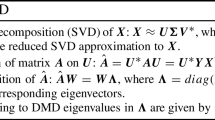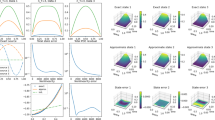Abstract
In this paper, we propose a data-driven model order reduction method to solve parameterized time-dependent partial differential equations. We describe the system with the state variable equations, and represent a class of candidate models with the artificial neural network. The discrete \(L_2\) error between the output of artificial neural network and the high-fidelity solution is minimized with the state variable equations and initial conditions as constraints. Therefore, the model order reduction problem can be described as a kind of optimization problem with constraints, which can be solved by combining Levenberg–Marquardt algorithm and linear search algorithm, followed by sensitivity analysis of the artificial neural network parameters. Finally, by a number of calculating examples, compared to the model-based model order reduction method, data-driven model order reduction method is non-intrusive, is not limited to state variable degrees of freedom. We can find that the data-driven model order reduction method is better than the model-based model order reduction method in both computation time and precision, and has good approximation properties.


















Similar content being viewed by others
Data Availability
The data that support the findings of this study are available from the corresponding author upon reasonable request.
Change history
29 October 2022
This article has been retracted. Please see the Retraction Notice for more detail: https://doi.org/10.1007/s10915-022-02036-x
References
Quarteroni, A., Manzoni, A., Negri, F.: Reduced basis methods for partial differential equations: an introduction. Springer, Berlin (2015)
Kunisch, K., Volkwein, S.: Galerkin proper orthogonal decomposition methods for a general equation in fluid dynamics. Soc. Ind. Appl. Math. 40(2), 492–515 (2002)
Abbasi, F., Velni, J.M.: Nonlinear model order reduction of Burgers’ equation using proper orthogonal decomposition, American Control Conferen, pp. 583–588 (2015)
Berg, J., Nyström, K.: A unified deep artificial neural network approach to partial differential equations in complex geometries. Neurocomputing 317, 28–41 (2018)
Rudy, S.H., Brunton, S.L., Proctor, J.L., Kutz, J.N.: Data-driven discovery of partial differential equations. Sci. Adv. 3(4), 1602614 (2017)
Raissi, M., Karniadakis, G.E.: Hidden physics models: Machine learning of nonlinear partial differential equations. J. Comput. Phys. 357, 125–141 (2018)
Raissi, M., Perdikaris, P., Karniadakis, G.E.: Machine learning of linear differential equations using Gaussian processes. J. Comput. Phys. 348, 683–693 (2017)
Santo, N., Deparis, S., Pegolotti, L.: Data driven approximation of parametrized PDEs by reduced basis and neural networks. J. Comput. Phys. 416, 109550 (2020)
Guo, M., Hesthaven, J.S.: Data-driven reduced order modeling for time-dependent problems. Comput. Methods Appl. Mech. Eng. 345, 75–99 (2019)
Wu, P., Sun, J., Chang, X., Zhang, W., Arcucci, R., Guo, Y., Pain, C.C.: Data-driven reduced order model with temporal convolutional neural network. Comput. Methods Appl. Mech. Eng. 360, 112766 (2020)
Audouze, C., Vuyst, F.D., Nair, P.B.: Nonintrusive reduced-order modeling of parametrized time-dependent partial differential equations. Numer. Methods Partial Differ. Equ. 29(5), 1587–1628 (2013)
Raissi, M., Perdikaris, P., Karniadakis, G.E.: Multistep neural networks for data-driven discovery of nonlinear dynamical systems, (2018), arXiv:1801.01236v1
San, O., Maulik, R.: Machine learning closures for model order reduction of thermal fluids. Appl. Math. Model. 60, 681–710 (2018)
Wang, Q., Hesthaven, J.S., Ray, D.: Non-intrusive reduced order modeling of unsteady flows using artificial neural networks with application to acombustion problem. J. Comput. Phys. 384, 289–307 (2019)
Hesthaven, J.S., Ubbiali, S.: Non-intrusive reduced order modeling of nonlinear problems using neural networks. Article in Journal of Computational. Phys. 363, 55–78 (2018)
Frescaa, S., Dedè, L., Manzonia, A.: A comprehensive deep learning-based approach to reduced order modeling of nonlinear time-dependent parametrized PDEs. J. Sci. Comput. 87, 61 (2021)
Frescaa, S., Manzonia, A.: POD-DL-ROM: enhancing deep learning-based reduced order models for nonlinear parametrized PDEs by proper orthogonal decomposition, (2021), arXiv:2101.11845v1
Fresca, S., Manzoni, A., Dedè, L., Quarteroni, A.: Deep learning-based reduced order models in cardiac electrophysiology. PLoS ONE 15(10), 0239416 (2020)
Raissi, M., Perdikaris, P., Karniadakis, G.E.: Physics-informed neural networks: A deep learning framework for solving forward and inverse problems involving nonlinear partial differential equations. J. Comput. Phys. 378, 686–70 (2019)
Chen, W., Wang, Q., Hesthaven, J.S., Zhang, C.: Physics-informed machine learning for reduced-order modeling of nonlinear problems. J. Comput. Phys. 446, 110666 (2021)
Mücke, N.T., Bohté, S.M., Oosterlee, C.W.: Reduced order modeling for parameterized time-dependent PDEs using spatially and memory aware deep learning. J. Comput. Sci. 53, 101408 (2021)
Benner, P., Gugercin, S., Willcox, K.: A survey of projection-based model reduction methods for parametric dynamical systems. Soc. Ind. Appl. Math. 57(4), 483–531 (2015)
Peherstorfer, B., Gugercin, S., Willcox, K.: Data-driven reduced model construction with time-domain Loewner models. SIAM J. Sci. Comput. 39(5), A2152–A2178 (2017)
Regazzoni, F., Dedè, L., Quarteroni, A.: Machine learning for fast and reliable solution of time-dependent differential equations. J. Comput. Phys. 397, 108852 (2019)
Regazzoni, F., Dedè, L., Quarteroni, A.: Machine learning of multiscale active force generation models for the efficient simulation of cardiac electromechanics. Comput. Methods Appl. Mech. Eng. 370, 113268 (2020)
Nelles, O.: Nonlinear system identification: from classical approaches to neural networks, fuzzy models, and Gaussian processes. Springer, Berlin (2021)
Gosea, I.V.: Model order reduction of linear and nonlinear systems in the Loewner framework, (2018)http://urn-resolving.de/urn:nbn:de:gbv:579-opus-1007899
Brunton, S.L., Proctor, J.L., Kutz, J.N.: Discovering governing equations from data by sparse identification of nonlinear dynamical systems. Proc. Natl. Acad. Sci. 113(15), 3932–3937 (2016)
Cybenko, G.: Approximation by superpositions of a sigmoidal function. Math. Control Signals Systems 2(4), 303–314 (1989)
Barron, A.R.: Universal approximation bounds for superpositions of a sigmoidal function. IEEE Trans. Inf. Theory 39(3), 930–945 (1993)
Hagan, M.T., Demuth, H.B.: Neural network design. China Machine Press, Beijing, China (2002)
Goodfellow, I., Bengio, Y., Courville, A.: Deep learning, the MIT Press, (2016), http://www.deeplearningbook.org
Bottou, L., Curtis, F.E., Nocedal, J.: Optimization methods for large-scale machine learning. Soc. Ind. Appl. Math. 60(2), 223–311 (2018)
Zhang, J., Yan, G.: Lattice Boltzmann method for one and two-dimensional Burgers’ equation. Phys. A 387, 4771–4786 (2008)
Manzoni, A., Pagani, S., Lassila, T.: Accurate solution of Bayesian inverse uncertainty quantification problems combining reduced basis methods. SIAM/ASA J. Uncertain. Quant. 4(1), 380–412 (2016)
Tiumentsev, Y.V., Egorchev, M.V.: Neural network modeling and identification of dynamical systems. Academic Press, London, UK (2019)
Acknowledgements
This work is supported by the Research Fund from Key Laboratory of Xinjiang Province (No. 2020D04002), the Natural Science foundation of China (No. U19A2079, 11671345, 91630205, 91852106, 92152301).
Funding
The authors have not disclosed any funding.
Author information
Authors and Affiliations
Corresponding author
Ethics declarations
Competing Interests
The authors have no conflicts to disclose.
Additional information
Publisher's Note
Springer Nature remains neutral with regard to jurisdictional claims in published maps and institutional affiliations.
This article has been retracted. Please see the retraction notice for more detail:https://doi.org/10.1007/s10915-022-02036-x
Rights and permissions
Springer Nature or its licensor (e.g. a society or other partner) holds exclusive rights to this article under a publishing agreement with the author(s) or other rightsholder(s); author self-archiving of the accepted manuscript version of this article is solely governed by the terms of such publishing agreement and applicable law.
About this article
Cite this article
Cheng, F., Xu, H. & Feng, X. RETRACTED ARTICLE: Model Order Reduction Method Based on Machine Learning for Parameterized Time-Dependent Partial Differential Equations. J Sci Comput 92, 64 (2022). https://doi.org/10.1007/s10915-022-01899-4
Received:
Revised:
Accepted:
Published:
DOI: https://doi.org/10.1007/s10915-022-01899-4




